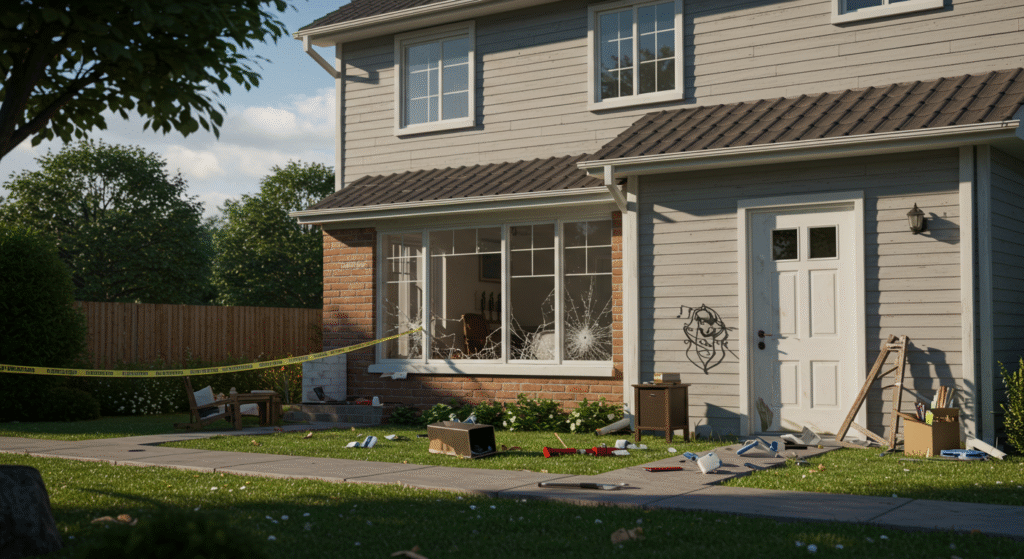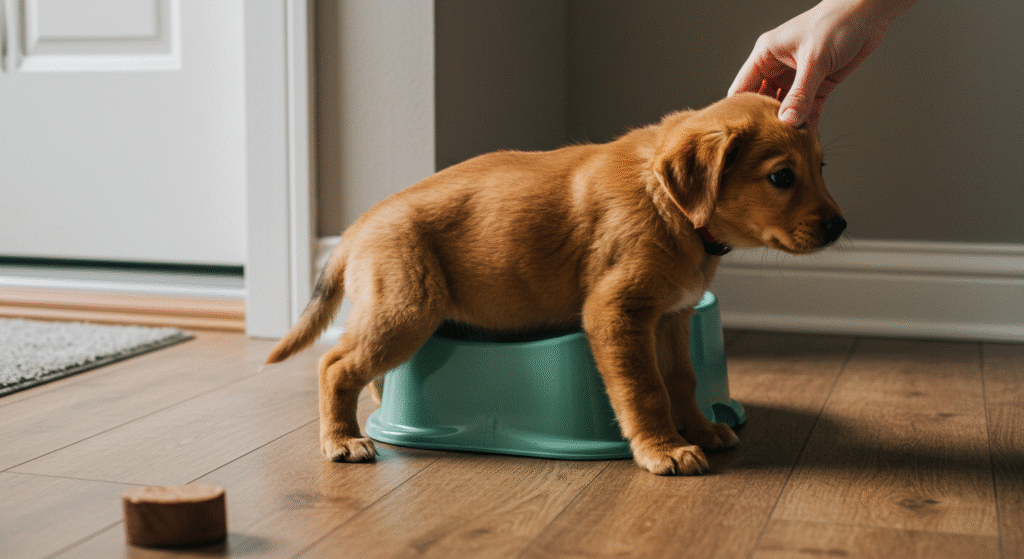Housebreaking. Whether you’re dealing with a mischievous puppy or considering the criminal implications of the term, this concept carries weight in various contexts. This blog dives deep into the dual meanings of housebreaking, offering insights, practical tips, and detailed advice.
From training an adult dog to understanding elements of housebreaking as a crime, this is the ultimate guide. Let’s start by decoding the term and navigating its complexities.
Table of Contents
- What Does Housebreaking Mean?
- Understanding Housebreaking as a Crime
- Housebreaking a Puppy 101
- How to House Train an Adult Dog
- Essential Elements of Housebreaking (Crime and Puppies)
- The House-Trained Person vs. the Housebreaker
- FAQs About Housebreaking

What Does Housebreaking Mean?
“Housebreaking” refers to two vastly different concepts, distinguished by their context.
- Pet-Related Definition
Housebreaking, in this scenario, involves training a pet (often a puppy) to eliminate waste in designated areas. This is commonly referred to as house training and is one of the essential steps in pet ownership.
- Crime-Related Definition
From a legal perspective, housebreaking is another term for burglary, which is the unlawful entry into a building—most often homes—with the intent to commit a crime. This aspect has serious legal and social implications.
- Historical Usage
Historically, housebreaking referred to the act of dismantling or taking apart a structure, such as demolishing an old house or building. This usage is less common in modern language but can still be seen in specific historical or architectural contexts.
- Metaphorical Usage
Metaphorically, housebreaking can also describe the process of adjusting or adapting to a new environment, role, or situation. For example, someone might use the term to describe the challenges of settling into a new home or workplace, emphasizing the effort required to become familiar and comfortable in unfamiliar surroundings.
When discussing housebreaking, always understand the contextual undertone. A house-trained dog is a sign of great pet management, while housebreaking as a crime entails serious criminal activity.
Key takeaway: The meaning of housebreaking hinges on whether we’re training pets or discussing legal offenses.

Understanding Housebreaking as a Crime
Housebreaking, synonymous with burglary, is more than just crossing into someone’s property without permission. Here’s everything you need to know:
Burglary Meaning
The term “burglary” refers specifically to entering a structure unlawfully, typically to commit a theft or another crime. Different regions may have specific definitions under legal statutes.
Key Elements of Housebreaking (Crime):
- Unlawful Entry
Entry must be unauthorized—either through force, deceit, or simply wandering in.
- Intent
For an act to be legally considered housebreaking, there’s usually an intent to commit a crime, like theft or vandalism, once inside.
- Physical Presence
Burglary often requires the physical presence of the offender inside the property.

Why Understanding Housebreaking is Crucial:
Understanding housebreaking is essential not only for legal professionals but also for the general public, as it impacts the safety and security of individuals and their properties.
Being aware of the key elements of this crime can help individuals take preventative measures to safeguard their homes and belongings.
Furthermore, a clear comprehension of housebreaking laws allows victims to report incidents accurately and ensures that the justice system can operate effectively to address these crimes.
Educational awareness about housebreaking can also foster community vigilance and reduce the likelihood of such offenses in neighborhoods.
Awareness of the elements of housebreaking can help individuals and property owners safeguard their assets.
Simple measures—like installing security cameras, strong locks, and lighting systems—can deter housebreakers.
Tip: Always report any signs of forced entry to local authorities immediately.

Housebreaking a Puppy 101
Training a puppy can be both rewarding and challenging.
A house trained dog is well-behaved, follows a routine, and makes home life easier for everyone involved.
Steps to Housebreak a Puppy:
- Set Up a Routine
Puppies thrive on consistency. Take them outside frequently, especially after eating or playing.
- Designate a Specific Area
Assign a “potty spot.” Reward your puppy with praise and treats when they go in the right place.
- Supervise Closely
Keep an eye on your puppy indoors to avoid accidents.
- Use Puppy Pads
Housebreaking puppy pads are helpful during the early stages. These pads absorb waste and keep areas clean.
- Positive Reinforcement Always Wins
Punishments can confuse your dog. Instead, reward correct behavior.
Challenges to Expect:
- Accidents will happen—it’s all part of the process.
- Be consistent, even when it feels frustrating.
Pro Tip: Avoid overwhelming your puppy with too many rules; focus on creating a calm and encouraging environment during training.
Housebreaking puppy pads make this process easier, but they are not a substitute for ongoing outdoor training.

How to House Train an Adult Dog
House training an adult dog requires patience, consistency, and understanding, especially if the dog has never been properly trained before or has developed bad habits.
Start by establishing a routine. Feed your dog at regular intervals and take them outside to the same spot shortly after eating, drinking, or waking up.
Positive reinforcement is key—praise and reward your dog immediately after they eliminate outside, making it clear that this is the desired behavior.
Accidents may occur, especially in the beginning.
Never punish your dog for mistakes, as this can create fear and confusion, potentially making the problem worse.
Instead, clean up accidents thoroughly with an enzymatic cleaner to prevent lingering odors that could encourage repeated behavior in the same spot.
If your dog has difficulty with the process, consider crate training as an effective tool.
Dogs are naturally inclined to keep their sleeping areas clean, so a properly sized crate can help in reinforcing control.
Be sure to give your dog plenty of opportunities to go outside to prevent accidents due to extended confinement.
With patience and consistent effort, even adult dogs can be successfully house trained.
Training an adult dog to be house-trained follows a similar approach to puppies but often involves undoing prior habits.

Steps to Train an Adult Dog:
- Identify Behavioral Patterns
Observe when and where the dog typically eliminates and set up new rules.
- Crate Training
Dogs won’t soil their sleeping areas. Crate training encourages them to hold their bladder.
- Schedule Regular Potty Breaks
Gradually increase intervals after your dog successfully eliminates outdoors.
- Positive Associations
Use treats and praise every time your dog eliminates outside.
- Address Regression
Be patient. Some adult dogs may take longer due to ingrained habits.
Training an adult dog might require more persistence compared to housebreaking a puppy. However, with time and consistency, you’ll see great results.
Friendly Reminder: Consult a vet if housebreaking difficulties persist as they might be health-related.

Essential Elements of Housebreaking (Crime and Puppies)
Housebreaking involves three critical factors, whether you’re training a dog or discussing burglary. Here’s a breakdown:
| Factor | Housebreaking a Puppy | Housebreaking as a Crime |
|---|---|---|
| Understanding Patterns | Learn your puppy’s habits and needs. | Watch for suspicious activity in your vicinity. |
| Setting Boundaries | Create designated potty zones. | Utilize secure locks and alarm systems to protect entry points. |
| Consistency & Vigilance | Repeat training steps daily. | Stay aware of signs like forced entry or unusual noises. |
Overlap: Notice how both scenarios require awareness and proactive measures.

The House-Trained Person vs. the Housebreaker
It’s fascinating how language evolves.
The term “house-trained” refers to someone who is well-mannered and adjusted to domestic life, whereas a “housebreaker” is an entirely different character.
Characteristics of a House-Trained Individual:
- Reliable in managing household responsibilities.
- Practices courtesy and respect for family dynamics.
- Responsive and adaptable to domestic routines.
Characteristics of a Housebreaker:
- Intent includes criminal gain.
- Operates unlawfully and potentially creates chaos.
Understanding the stark contrast between these terms offers an engaging look at language and behavior.
Interesting Note: Both terms signify different disciplines but share a linguistic root tied to homes.

FAQs About Housebreaking
- What is the primary difference between housebreaking a puppy and an adult dog?
Puppies are learning from scratch, while adult dogs may need to unlearn bad habits.
- What does housebreaking mean in legal terms?
Housebreaking in legal terms refers to the act of unlawfully entering someone else’s property, typically with the intent to commit a crime such as theft. This term is often associated with breaking and entering, though the specifics can vary depending on regional laws. It is considered a severe offense, and the penalties may include fines, imprisonment, or both, depending on the circumstances and the severity of the crime. Understanding the legal implications of housebreaking is essential for comprehending property laws and individual rights.
- What is the act of housebreaking?
Housebreaking refers to the unlawful act of entering someone else’s property, often with the intent to commit a crime, such as theft or vandalism. It typically involves breaking and entering, but the methods and specific definitions can vary based on local or regional laws. Housebreaking is considered a criminal offense and carries severe penalties, including fines or imprisonment, emphasizing the importance of respecting property rights and legal boundaries.
- How is housebreaking different from burglary?
Housebreaking and burglary are closely related, but burglary typically involves the intent to commit a felony or theft upon entering the property, whereas housebreaking may not necessarily include such intent and can involve other unlawful acts.
- What are the common signs of a housebreaking attempt?
Common signs include broken locks or windows, forced doors, damaged entry points, or misplaced items near entryways. These signs often indicate an attempt to gain unauthorized access.
- Are all forms of housebreaking considered felonies?
Not always. The classification of housebreaking as a felony or misdemeanor depends on the jurisdiction and the circumstances surrounding the crime, such as intent or severity of damage caused.
- Can housebreaking occur during the daytime?
Yes, housebreaking can happen at any time of day or night. Criminals may choose daytime, assuming the property is unoccupied, making it less suspicious.
- How can I prevent housebreaking?
Installing robust security measures such as alarm systems, surveillance cameras, motion-detecting lights, and reinforced locks can help deter potential housebreakers. Maintaining good relationships with neighbors to keep an eye out for suspicious activities is also beneficial.
- What should I do if I suspect a housebreaking incident?
If you suspect a housebreaking incident, avoid entering the property and immediately contact law enforcement for assistance. Preserving potential evidence is crucial for investigations.
- What are the legal consequences of housebreaking?
Legal consequences vary by jurisdiction but often include heavy fines, imprisonment, and a criminal record. The severity of the punishment depends on the extent of damage, intent, and any crimes committed during the act.
